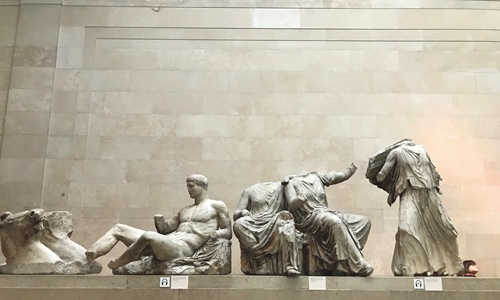
The Parthenon Marbles are displayed at the British Museum. Also known as the Elgin Marbles, the prized artifacts are a collection of classical Greek marble sculptures from the fifth century. Photo: Sun Wei/GT
Britain said Tuesday it had agreed with Greece that a long-running dispute between the two countries over the Parthenon Marbles "in no way affects the strength of the UK-Greece partnership."The contentious 2,500-year-old sculptures, popularly known as the Elgin Marbles, were raised by Greek Prime Minister Kyriakos Mitsotakis as he met his British counterpart Boris Johnson in London, the UK leader's office said.
"The Prime Minister said that he understood the strength of feeling of the Greek people on this issue, but reiterated the UK's longstanding position that this matter is one for the trustees of the British Museum," a Downing Street spokesperson said after the meeting.
"The leaders agreed that this issue in no way affects the strength of the UK-Greece partnership."
In an interview earlier in 2021 Johnson ruled out the return of the marbles to Greece, insisting they were legally acquired by Britain and legally owned by the British Museum's Trustees since their acquisition.
The sculptures were stripped from Athens' Parthenon Temple on the Acropolis by Scottish nobleman Thomas Bruce, known as Lord Elgin, in the early 1800s and shipped to Britain.
Elgin sold the marbles to the British government, which in 1817 passed them on to the British Museum where they remain one of its most prized exhibits.
London has long argued that the sculptures had been taken by Elgin with permission from the Ottoman Turks who ruled Greece at the time, but Athens insists the marbles were stolen.
Johnson's assertion in March that the sculptures belong to Britain came as Greece readied to commemorate the bicentennial of the country's 1821 revolution.
AFP
